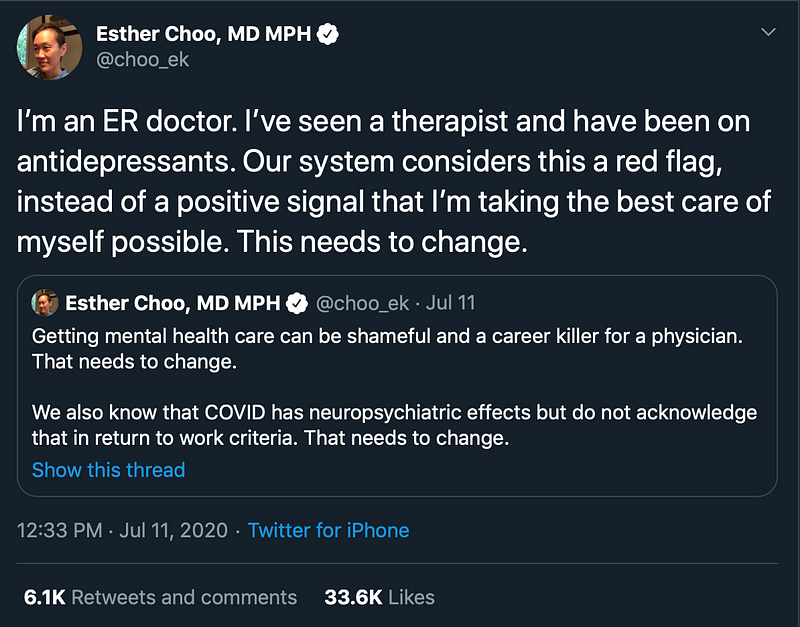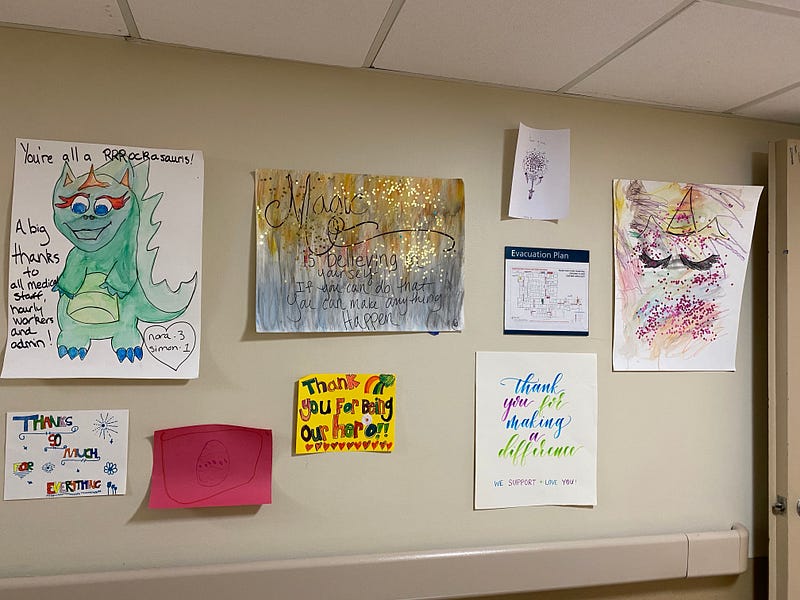Who Will Be There to Care for America in the Future?
Written on
Chapter 1: The Mental Health Crisis Among Healthcare Workers
Recently, during a discussion about the well-being of healthcare professionals, a reporter inquired about my mental health as the situation in Illinois began to improve. I found myself gradually returning to a sense of normalcy in my work, with patients coming back to the Emergency Department presenting familiar cases like chest and abdominal pain. Just a few months earlier, I was preoccupied with the relentless demands of the COVID-19 pandemic, constantly updating myself on evolving symptoms, treatment protocols, and the latest information.
As our conversation progressed, the reporter directly asked if I had sought help from a mental health professional during the pandemic. I felt a wave of anxiety wash over me, hesitating before answering. As doctors, we are trained to project strength and resilience, yet I could not overlook the emotional toll the past year had taken on me, and I recognized I was not alone in this struggle.
"Yes," I eventually confessed, surprising myself. I feared that if my admission were published, it would be perceived as a sign of weakness. In reality, the stress from the pandemic, combined with parenting and the usual life pressures, had become overwhelming. I found it increasingly difficult to concentrate or resolve even minor issues, trapped in a cycle of worry that left me exhausted and sleep-deprived. I needed someone to help me process my feelings about the pandemic's impact on my family, friends, colleagues, and patients—someone to provide an outside perspective to help organize my thoughts.
The day after my interview, the New York Times published a heartbreaking article about Dr. Lorna Breen, an emergency physician in New York who had battled COVID-19 but ultimately succumbed to the mental health challenges brought on by the pandemic. Following this, Dr. Esther Choo, a well-known physician on social media, shared her own experiences of therapy and antidepressant use, prompting an outpouring of similar confessions from other healthcare workers. This collective acknowledgment aimed to break the stigma within our profession that often forces us to suffer in silence, leading many to burnout and tragically higher suicide rates compared to other professions.

Despite my own challenges easing as Illinois moved into phase 4, I remain acutely aware of the ongoing struggles faced by my colleagues in states like Texas, Arizona, and Florida, where support is desperately needed. I also recognize the possibility of a resurgence in cases affecting my own region, leading to a return of the fears and anxieties that had begun to fade.
During the initial lockdown, I felt a surge of support from across the nation for healthcare workers. Dubbed "healthcare heroes," I never felt I deserved that title, but appreciated the gratitude directed toward us as we navigated a crisis unlike any we had encountered in our training.

However, as the situation has evolved, those in states facing high case numbers must continue to wear PPE and work in hazardous conditions while enduring a barrage of misinformation and hostility aimed at the medical community. A vocal minority has labeled healthcare workers as dishonest, while some leaders have manipulated scientific data to suit their agendas, prioritizing profit over public health.

Moreover, the censorship of vital information raises troubling questions. Is this an attempt to shield the public from the harsh realities of the pandemic? While bad news is uncomfortable, it shouldn't be left to healthcare professionals and those who have personally experienced loss to advocate for the reality of the situation, or to emphasize the importance of precautions like wearing masks.

As healthcare workers, we remain committed to caring for the sick and supporting families mourning their losses from a disease we are still striving to understand fully. It often feels like a betrayal, a "stab in the back," for those of us who have devoted our lives to medicine, sacrificing our own well-being for the profession.
How can healthcare providers endure the emotional toll of witnessing life's tragedies while facing such unwarranted hostility? Expecting a single group of individuals to shoulder the burden of controlling COVID-19 while maintaining their mental and physical health is neither realistic nor sustainable. Relying solely on healthcare professionals to manage the fallout of this crisis is not a viable solution.
When healthcare providers reach their breaking point, who will be there to care for America?
Chapter 2: The Future of Healthcare
In this video, experts discuss the potential challenges America may face in the next three decades, highlighting the systemic issues that could lead to significant societal collapse.
This video features President Trump's remarks at the Conservative Political Action Conference, shedding light on the political climate that influences healthcare policies and public perception.